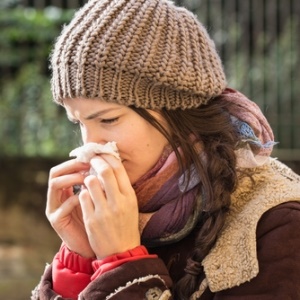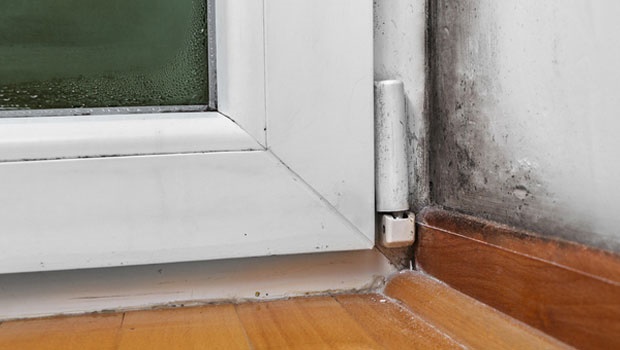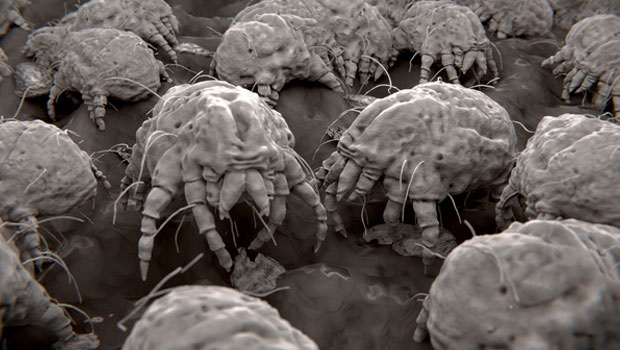
Seasonal allergies are usually associated with spring and summertime when pollen levels are high, but colder winter weather can increase your chances of being exposed to a completely different array of triggers.
Many winter allergens or irritants can result in allergic rhinitis, or hay fever as it is more commonly known. Allergic rhinitis occurs when the body's immune system overreacts to a certain substance, causing nasal inflammation and resulting in excessive mucus production, nasal congestion and post-nasal drip.
Common symptoms include:
- Coughing and/or wheezing
- Itchy or sore throat
- Watery, red eyes
- Running or blocked nose
- Itching, irritated skin
These are five common causes of winter allergies:
1. Fireplace smoke

When the cold weather hits, many of us love nothing more than to cosy up in front of a roaring fire with a glass of red wine or cup of hot chocolate. Unfortunately, though, your lovely fire could be causing a number of different allergy flare ups.
Smoke from wood fires is a common irritant, often causing congestion, itchy eyes and a sore throat. If you suffer from these symptoms, be sure that your fireplace and the room where it is located, are properly ventilated. The American College of Asthma, Allergy and Immunology recommends that you avoid sitting close to the fire place and always sit upwind of braais and other outdoor fires.
For the estimated 3.9 million South Africans who suffer from asthma, many will experience asthma attacks triggered by smoke. If you know that smoke worsens your asthma, avoid exposing yourself to fire wherever possible.
2. Pet dander

Approximately 15-30% of allergy sufferers are allergic to pet dander (hair), the Asthma and Allergy Foundation of America explains. If you have an allergy to pet hair, it probably affects you throughout the year but winter can cause more flare ups than usual. This is because your pets are likely to spend far more time inside when the weather is cold than they do in summer. You're also less likely to leave your windows and doors open, which means your house isn't well-ventilated in winter.
If this is the case in your household, be sure to vacuum more regularly than you usually would. Keep your pets out of your bedroom and discourage them from lying on the couches. Groom dogs and cats regularly to prevent extra shedding but rather do so outdoors to avoid additional shedding in the house.
If you're allergies are severe, you may need to consider rehoming your pets.
3. Mould

Mould is found everywhere – on food, out in the garden, in the kitchen, bathroom and even inside your washing machine. In winter many assume that a running nose, sneezing and coughing are signs of a cold where in fact, they could be caused by an allergy to mould.
Mould releases spores into the air which can be inhaled or come into contact with the skin, potentially resulting in an allergic reaction. It is estimated that as many as 20% of asthma sufferers also have an allergy to mould.
It thrives in warm, damp conditions and is therefore more prolific in coastal or tropical areas of South Africa such as Kwa-Zulu Natal, the Allergy Society of South Africa explains.
If you have a mould allergy, be sure to keep your house well-ventilated. This can be tricky in winter but consider keeping windows open in the day and then closing them at night. Limit the amount of plants you have in the house as these are often guilty of housing mould. Keep your firewood outside as mould can easily grow on damp wood. Don't dry wet laundry on your heater as this encourages the growth of mould.
4. Dust mites

If you suffer from an allergy to dust mites, you may have noticed that your allergies worsen during winter. This is because you are likely to spend more time indoors when the weather is chilly, Columbia University Medical Centre explains. You're also more likely to keep your windows and doors closed during winter which means the air in your home isn't as well ventilated as it would be in warmer months.
Reducing the amount of dust in your home will help to improve your allergy symptoms. As with pet dander sensitivities vacuuming your home more regularly during winter will help. The NHS recommends choosing a vacuum with a HEPA (high efficiency particulate air) filter as it will remove more dust than regular vacuum cleaners.
When the colder weather strikes, you may want to haul out additional blankets, down duvet covers and winter bedding. While these may keep you cosy, it is likely that have accumulated a lot of dust since they were previously used. Where possible, wash bedding and blankets on a hot cycle (60 degrees) in you washing machine. Alternatively, air thick blankets and duvets outside if the weather permits.
5. Wool

Knitted jerseys, scarves and beanies may help to fight off the cold but they can also irritate your skin. While many people break out in red itchy bumps when wearing woollen clothing, the majority are just sensitive to the coarse texture of the wool, the Livestrong Foundation explains. Others can develop allergic contact dermatitis as a result of wearing wool. Medline Plus indicates that this can vary in severity from a mild itch to raw patches of skin or weeping blisters.
If you're sensitive to wool but still want to wear those winter knits, go for garments made from finer, higher-grade wools such as Merino. Also be careful of cheap wools as these may have additional chemicals. If you suffer from severe contact dermatitis, it is probably best to avoid wool all together and perhaps choose clothing made of synthetic wool, cotton or other materials.
Read more:




 Publications
Publications
 Partners
Partners











